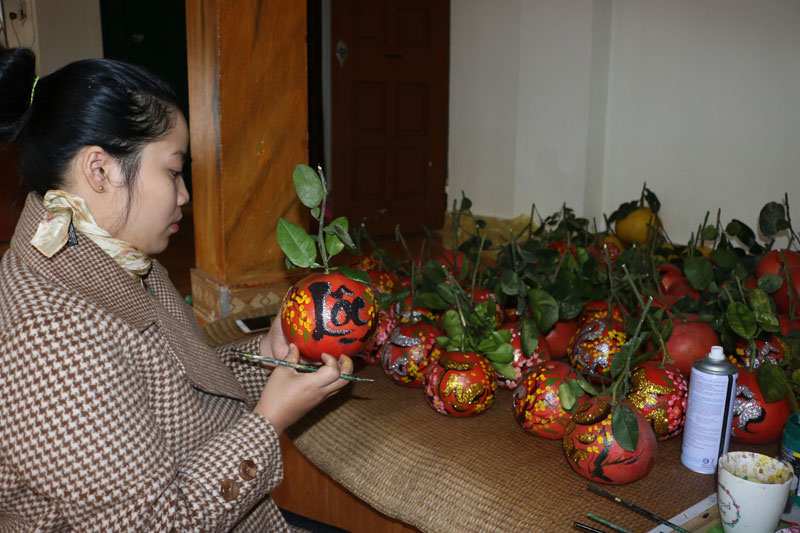
(HBO)- Five-fruit tray is an indispensable part for Vietnamese traditional Tet. Painting Tet pictures and calligraphy on polemos, melons and coconut fruits is a new trend for Hoa Binh people. Sticking with the passion for painting for a long time, 3 years ago, Ms. Nguyen Thi Nong, group 12, Thinh Lang ward (Hoa Binh city) boldly tried to work on drawing calligraphy on fruits, creating new and unique products to attract people.
She was the first person to bring the
movement of calligraphy on fruits to Hoa Binh city.
Each product is drawn in about 15-20 minutes
depending on the difficulty and the fussiness of the patterns. On average, she
produces 100 products per day. Each fruit after finishing is 150,000 - 200,000
VND. Most of the customers’ orders are from Hanoi, customers in the province
are not many. They have mainly ordered for the Lunar New Year. Each product is
polished and meticulously made by Mrs. Nong from the stage of picking fruits,
choosing the paint and the painting color, to covering the lines on the
drawings to match and stand out. She herself directly cut polemo fruits in Tan
Lac district. Currently, due to the increasing demand of the customers, she
imported Tien Vua pomelos in Tuyen Quang province. These fruits presented on
the five- fruit tray look eye-catching, unique and strange.

Ms. Nguyen Thi Nong painted calligraphy with
the word "Loc"(Wealth) on Tien Vua pomelos according to the orders
In order to paint after drying faster, some
places often bring to drying, but Ms. Nong chose to dry naturally. It takes a
long time to wait, but the quality is much better. The fruit will not be
withered and burnt and it will take a long time to be damaged. The material to
create a complete product is simple, only fruit, non-toxic acrylic paint and a
bit of purl to cover the surface of calligraphy. Textures favored by customers
are cherry blossoms, apricot flowers and calligraphy letters "Phuc",
(Happiness) "Loc"(Wealth),
"Tho" (Long Age) ... The main color is red - the color of peace,
luck. Besides there is a yellow color of apricot blossom and green shoots of
trees.
This year, the number of orders is more than
1,000 ones, estimating that the number of orders will be more when it is near
Tet holiday. Due to the increasing demand of customers, Ms. Nong will try to
draw on many different kinds of fruits and create more patterns in the coming
time.
With just over a month left until the school summer break, students are eagerly anticipating a period of rest and fun after a year of academic pressure. To provide a healthy environment for the physical development, in addition to the classes that foster talents and enhance the academic knowledge, sports and physical activities continue to attract a large number of children and teenagers.
On April 17th, Hoa Binh Provincial Museum organized a program to promote and introduce the outstanding values of "Hoa Binh Culture” at the Boarding Secondary and High School for ethnic minority students in Mai Chau District.
The Hoa Binh College of Technical Technology, in collaboration with the Hoa Binh Technical and Economic College and the provincial Association of Literature and Arts, hosted a gathering on April 15 to celebrate Laos’ traditional Bunpimay (New Year) Festival 2025 and debut the new book "Nguoi Muong o ban Don” (Muong people in Don village).
In the millennia-long history of national construction and safeguarding, people of all ethnic groups in Hoa Binh have been united and closely bound together to overcome all difficulties and challenges, standing alongside the entire Vietnamese people throughout the history of building and defending the country.
Living green is a healthy, positive, and sustainable lifestyle that not only helps protect
the environment and quality of life but also conserves natural resources and ecosystems.
Among the many ways to embrace this lifestyle, reducing plastic consumption is one of the most impactful.
The women's unions at all levels in Kim Boi district have been making significant contributions to the movement of building cultural life in the local community.
The movement helps improve rural look and the spiritual and material lives of local residents.



